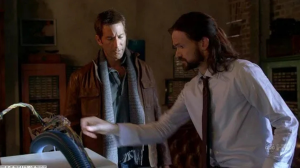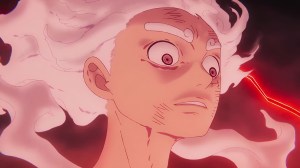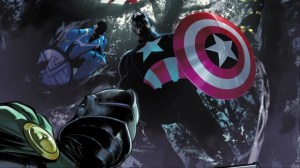Actor Robert Englund has spent most of his career disappearing into roles, as he got his start playing a variety of different characters, each one allowing him to entirely transform himself to meet the needs of the story. In 1984, Englund brought to life one of the most iconic villains in cinematic history as Freddy Krueger in A Nightmare on Elm Street, a role that he would be intrinsically linked with for decades. While the new documentary Hollywood Dreams and Nightmares: The Robert Englund Story could have spent its entire run time exploring the impact of Krueger, the film instead explores Englund’s sprawling career, including how he came to be Freddy and the character’s impact on his work in subsequent years. Hollywood Dreams and Nightmares: The Robert Englund Story hits Screambox and Digital HD on June 6th.
Videos by ComicBook.com
“I’ve been approached by various people with different ideas and designs on how to do something, and when the guys from Cult Screenings, Gary Smart and Chris Griffiths, approached me, I was feeling them out a bit, and within minutes, literally, I realized that these guys were fanboys like me. Not just of genre, not just of horror and science fiction and fantasy films, but that they also loved all movies, all kinds of movies,” Englund shared with ComicBook.com of how the documentary came together. “They’re so quick and they’re so smart. They’re like having your own personal IMDb right with you wherever you are. So we’d be talking and I was feeling them out a bit, and I was talking about Hammer Films and there was some actor I couldn’t quite remember, and I, ‘Who am I talking about?’ And they go, ‘You mean Herbert Lam?’ And I go, ‘Yes, Herbert Lam, and he did Phantom of the Opera.’ And he did this and that, not just the Pink Panther films. Or I’d be talking about one of my favorite early ’70s actors or late ’60s actors in Peck and Bond movies or something, and they’d go, ‘Oh, yeah, you’re talking about Warren Oates,’ and I go, ‘Yes, Warren Oates. I love Warren Oates.’ And then I could tell an old Warren Oates story from an old television series that I discovered him on when I was a kid. And Strother Martin. They were just always there for me and had my back, and I knew that they would have my back.”
He continued, “Then we laid the ground rules, and my idea was, ‘Look, this is not a movie about a great talent here. It’s a movie about a survivor.’ And if you guys see it that way, a character actor who survived for 50 years — and this month is literally my 50th year starring in movies in Hollywood — that would be okay with me. If you want to do a movie about talent, go find Daniel Day Lewis. I’m a survivor. Hills and valleys, ups and downs, good stuff, bad stuff. They saw that, and I didn’t have any say in or even knowledge of who they were interviewing or my colleagues that they approached or stuff.”
While Englund did give the filmmakers the approval of moving forward on the project, he remained relatively hands-off from the actual development of the documentary, and while he may have suggested some highlights from his career to be featured, it was a bizarre experience hearing his peers talk about him as if he was gone.
“I suggested a couple of clips. Being a man’s man, I wanted one of my fight scenes in there. I think I also wanted a dance montage from a couple of my silly little dance moves that I did in Strangeland and a couple of other films. But I think, fortunately, they chose not to do a ‘Robert Englund Dances,’” Englund joked. “Maybe in the sequel. But I was thinking of these funny little jigs I did, like that awkward dance step that Elaine does on Seinfeld, times when I did that, and there were several I thought might be fun edited together, but I think they were wise not to do that. I just felt comfortable with Gary and Chris. It’s hard for actors to watch themselves in movies or guest starring on TV or cable or streaming, but it’s even harder watching a documentary about yourself, aside from watching your hairline recede. And I’m getting on in years. I don’t mean it’s like, ‘Let’s give him an award. He’s going to die,’ but it’s a bit like Tom Sawyer and Huck Finn attending their own funeral, hearing people talk about you that way.”
He added, “I know Lance [Henriksen], and Lance and I bullsh-t each other in bars all around the world, and Heather Langenkamp and I have had cocktails everywhere from Sweden to London to New York and back. But Heather, I would never get Heather to say anything nice about me. She’s always teasing me and I’m always teasing her, and it’s real strange and a little awkward and a little uncomfortable to hear people talk about you that way.”
In addition to hearing his peers gush about him, Englund also pointed out the bizarre experience of witnessing 50 years of your life condensed into a feature film.
“When I first saw it premiere in Spain at the end of last year, it was a little strange, because you do see yourself, your physiognomy differently when you watch yourself on film. That enters your brain, and you do dream about it. That’s why a lot of directors don’t want actors to see dailies, to see rushes of themselves, because you see yourself unedited. There’s no editing,” Englund expressed. “It’s just the master shot or just your coverage over and over and over again without the other person listening to you or talking to you or speaking to you. It’s never going to be like that in the movie, but that unedited view of yourself can really haunt you, and it’s the same thing watching a documentary, because to hear people talk about you and then to see yourself young and then old and then young and then old, it’s a little disconcerting, but I’m glad that they agreed with me and we made it a movie about an old character actor, a utility actor that survived for 50 years and what goes into that.”
Even with the acclaim he has earned throughout his career, Englund still faces the same struggles other performers or filmmakers have faced, as he reflected on projects that never came to fruition and upcoming projects he has in the works.
“There’s been one or two directorial projects that have gone into turnaround, I call it. I think it’s forever turnaround now, and that’s unfortunate, because I spent a year of my life on one of them and had everybody, a lot of people promised to me, Christopher Lee among others. And you have to learn to let go of that stuff,” Englund confessed. “I was supposed to do a really huge movie with Arnold Schwarzenegger a couple of years ago, A Year in Spain. It would’ve been my Klaus Kinski role, and it was never made. There were financial things, but you have to let that stuff go. I mean, I regret that I never got to — I understudied Iago [from William Shakespeare’s Othello] in my youth, but there was probably a time in my 40s and early 50s when I could have done a hell of a job as Iago. It would’ve really taken some prep to get my chops back up to do a run instead of just a one-off, because I was so spoiled by film work by then, but that’s a bit of a regret. But no, actors always say, ‘What’s your favorite job?’ And I always say, ‘The next one,’ and that’s true.”
He pointed out, “I have a wonderful little script I’m hoping to do in October. I have a little low-budget horror movie coming out with Danielle Harris, directed by my Phantom of the Opera director, Dwight Little, and I’m anxious to see that. I think there’s a screening next month in Hollywood, called Natty Knocks, Natty as in Natalie. Her real name is Knox, K-N-O-X, but Natalie Knocks, it’s a Freddy Krueger nursery rhyme, and I love the hook of it. It’s a scream queen who goes back to her hometown.”
Hollywood Dreams and Nightmares: The Robert Englund Story hits Screambox and Digital HD on June 6th.
Are you looking forward to the documentary? Let us know in the comments below or contact Patrick Cavanaugh directly on Twitter to talk all things Star Wars and horror!








